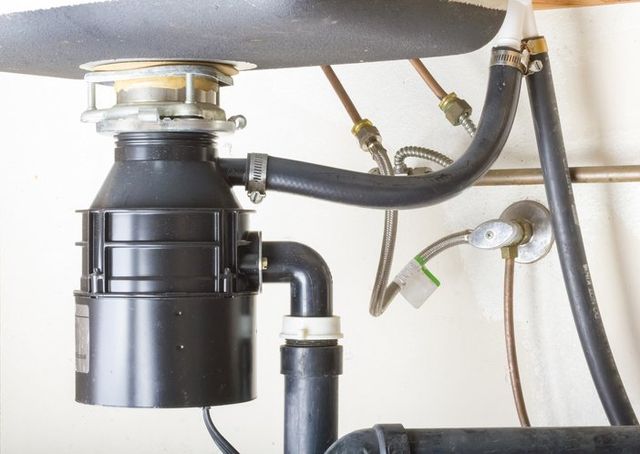Clear Instructions for Repairing a Leaky Waste Disposal
Clear Instructions for Repairing a Leaky Waste Disposal
Blog Article
What are your ideas about The Handy Guide To Fixing Your Garbage Disposal Leaking?

Waste disposal unit are vital kitchen devices that aid in dealing with food waste effectively. Nevertheless, a leaking waste disposal unit can be a frustrating and unpleasant problem to manage. The good news is, several leaks can be fixed quickly with a few basic actions. In this short article, we will certainly go over how to deal with a dripping waste disposal unit effectively.
Introduction
Garbage disposals are set up under kitchen sinks and are developed to shred food waste into smaller sized items, allowing it to go through the plumbing system easily. While these devices are usually reliable, leaks can take place in time due to deterioration, loosened connections, or damages to the device.
Step-by-Step Overview to Repairing a Dripping Waste Disposal Unit
Switch off the Power
Prior to trying any type of fixings, guarantee that the power to the waste disposal unit unit is turned off to stop the threat of electric shock.
Locate the Leakage
Identify the exact location of the leakage and determine the reason
Tighten Links
Utilize a wrench to tighten up any loosened links in between the disposal unit and the plumbing system.
Change Seals or Gaskets
If the leakage results from used seals or gaskets, eliminate the old parts and replace them with new ones.
Patching Splits or Holes
For fractures or holes in the disposal device, use epoxy or a suitable patching material to secure the broken location.
Determining the Source of the Leakage
Prior to attempting to deal with a dripping garbage disposal, it is necessary to identify the source of the leak. This can typically be done via aesthetic inspection or by conducting easy tests.
Visual Evaluation
Inspect the garbage disposal device carefully for any indicators of water leak. Pay attention to areas around seals, gaskets, and link points.
Evaluating for Leakages
One method to test for leaks is by running water with the disposal device and looking for any type of noticeable indications of leakage.
Common Sources Of Leaks in Rubbish Disposals
Worn Seals and Gaskets
Seals and gaskets play a crucial role in protecting against water from leaking out of the garbage disposal. Over time, these components can weaken, causing leakages around the disposal system.
Loose Links
The links in between the waste disposal unit and the pipes system can end up being loosened over time, causing water to leakage out throughout operation.
Splits or Holes in the Disposal System
Physical damage to the garbage disposal, such as fractures or openings in the housing, can likewise result in leakages.
Tools and Products Needed for Fixing a Leaking Garbage Disposal
Before beginning the fixing process, collect the required devices and materials, including a screwdriver, flexible wrench, plumbing professional's putty, replacement seals or gaskets, and epoxy or patching product for repairing fractures or openings.
Evaluating the Garbage Disposal After Repair Service
As soon as the repair work is complete, examine the waste disposal unit by running water through it to ensure that the leakage has actually been solved.
Preventive Upkeep Tips to Stay Clear Of Future Leaks
To stop future leakages, it is necessary to perform regular upkeep on your waste disposal unit. This includes keeping it tidy, avoiding putting non-food products or tough things down the disposal, and regularly checking for leaks or various other issues.
Final thought
Finally, fixing a leaking waste disposal unit is a fairly simple process that can be completed with fundamental devices and products. By complying with the actions outlined in this post and practicing preventive maintenance, you can maintain your garbage disposal in good working problem and avoid costly repair services in the future.
HERE’S HOW TO FIX YOUR GARBAGE DISPOSAL
WHAT TO DO IF SOMETHING IS STUCK IN YOUR GARBAGE DISPOSAL
If the impeller won’t turn, there’s probably something stuck in the disposal. It could be a steak bone or peach pit, although plumbers report pulling all sorts of inappropriate objects out of disposals, such as bottle caps or aluminum foil. Make sure power to the disposal is off, and look inside to see if you can see the source of the jam.
Never stick your fingers in a disposal. Pull out anything you see with tongs or pliers.
If the disposal still won’t work, it may be time to call a plumber or consider buying a new disposal. GEM Plumbing & Heating is here for all of your garbage disposal needs.
WHAT TO DO IF YOUR GARBAGE DISPOSAL DRAIN IS CLOGGED
Take everything out from underneath your sink and put a bucket or other container under your disposal to catch any water that drains out. Disconnect your disposal from the power supply. If it’s plugged into a wall outlet, unplug it. If it’s hardwired into an electrical box, go to the electrical panel and turn off the breaker for the disposal. Pour ¼ cup of baking soda into the drain, followed by ½ cup of white vinegar. Give the solution a few minutes to fizz and do its work. Look into the disposal with a flashlight to see if you can see an object that might be causing the clog. If you see it, remove it using tongs or pliers. MORE TIPS ON DEALING WITH A CLOGGED GARBAGE DISPOSAL
Never use drain cleaner in a garbage disposal. It can damage the plastic parts inside the disposal. You can also be splashed with the caustic liquid while working to clear the clog. Beware! Never stick your fingers into a garbage disposal. Trust us — not a good idea. In many instances, your dishwasher drains through your garbage disposal. This allows the disposal to grind any large food particles that may be drained out of your dishwasher. There are some jurisdictions, however, where the plumbing code prohibits such a connection. WHAT TO DO WHEN YOUR DISHWASHER DRAINS THROUGH THE DISPOSAL
Run some water in the sink so your plunger has at least a ½-inch of water to create a seal and plunge vigorously up and down several times. You may need to repeat this several times. Run hot water down the drain to clear any residue that remains.

I found that article on Why Is when scouting around the internet. Sharing is good. One never knows, you could be doing someone a favor. Bless you for your time. Come back soon.
Schedule Here Report this page